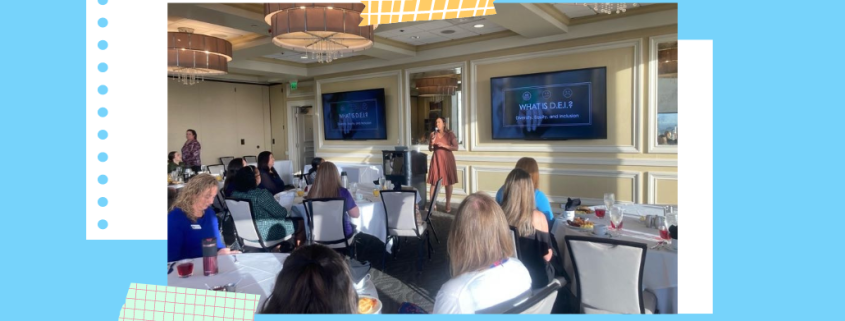Recap: Enhancing DEI Efforts in Today’s Climate
By Manuel Solis-Bauza, DEI Committee
Introduction:
This Black History Month, PRSA Orlando was honored to have Tekoa Pouerie, Certified Implicit/Explicit Trainer, talk to our members about what it means to understand Diversity, Equity, and Inclusion (DEI) in the workplace and how to best apply critical components of bias awareness into our workspaces in today’s climate.
Pouerie is a certified implicit/explicit bias trainer. Her advice to PRSA Orlando members tackles how to approach difficult questions about bias and how to best address that bias inclusively and equitably.
Explicit vs. Implicit Bias
Bias can take on many forms, but to be able to tackle it at its roots, it is important to identify what kind of bias is being enforced. This is where Pouerie says that explicit and implicit bias comes into play. In short, explicit bias is a conscious, active choice someone makes to inject bias into a situation. For example, linking certain demographics or groups to negative stereotypes is an explicit form of bias.
On the other hand, implicit bias is unconscious. It is expressed indirectly through non-verbal communication or subtle actions indicating where those biases lie. An example of this would be preferring to work with teammates with familiar-sounding names than those from other cultural or ethnic groups.
The Impact of Diversity
Once bias has been identified, tangible steps can be taken to address it. One action Pouerie suggests is simply to look around the room and ask yourself these questions: Who are your teammates? What groups do they represent? Are your hiring practices reflective of your implicit biases?
This is important for many reasons. Pouerie explains that companies with gender and racial diversity tend to overperform in relation to their industry peers. To put it simply, if your teammates represent a wide range of the population you are servicing or appealing to, more creative ideas and processes can be utilized to optimize your output. Diverse peoples have diverse ideas, and including them in the conversation serves everyone.
How Do We Celebrate Differences?
Finally, how can we make sure to celebrate the differences diverse people bring to the table? Once our biases have been tackled, Pouerie suggests that our efforts are not yet over. To retain that diversity, steps must be taken to ensure that people feel included in the conversation, not just tokenized.
The phrase “pull yourself up by the bootstraps” is all too common in our culture, but Pouerie suggests amending it to add “…and give boots to those without boots.” In essence, it’s not enough to tell others to work harder. When someone from a different background than yours approaches you with an idea or a concept, it’s important to hear them out and make them feel included. Certain team members enjoy levels of privilege that others might not. It falls on those team members to include diverse voices and ideas at the table when discussing the next steps for a strategy or campaign.
In summation, when diverse voices and ideas are heard, people feel appreciated and included.
Promoting DEI and eradicating bias in the workplace is an ongoing effort. It’s not enough to simply hire someone or review your hiring policies to remove bias. As Pouerie explains, it’s important to always stay alert and self-check when your actions could be rooted in bias and stereotypes. Allowing others to have their voices heard or using your position of power to include someone in important discussions of business goes a long way to making someone feel like a part of a team. Ultimately, people need to feel like they are not alone. People are capable of just about anything if they feel supported and appreciated.
About our Speaker, Tekoa Pouerie
For nearly two decades, Tekoa has dedicated her professional career to helping others create positive changes within the workplace and communities.
As a Certified Implicit/Explicit Trainer, Tekoa has trained over 10,000 criminal justice professionals including judges, trial lawyers, and law enforcement officers on how to recognize and reduce bias when in the workforce.
Educating others is only part of Tekoa’s unique skills. She understands that for change to happen, monetary resources need to be available to support the cause. She has helped raise over $10 million for non-profits including Power Promise, Harbor House and Pace Center for Girls. Her fundraising efforts and development strategies help organizations reach their long-term revenue goals that help change the lives of women, children, and youth in need. Tekoa’s unique blend of training will help educate, transform, and improve community leaders.
Learn more at https://www.letserasethelines.com/home.



